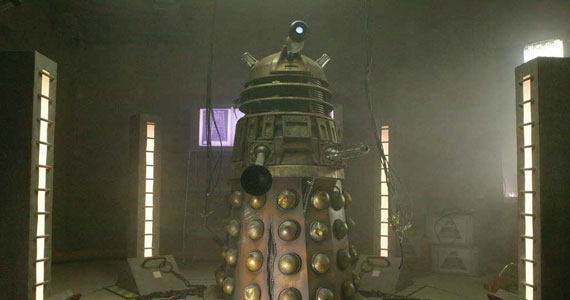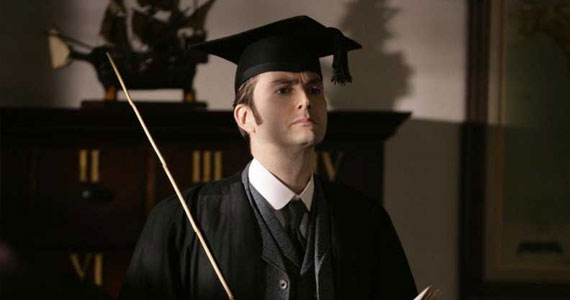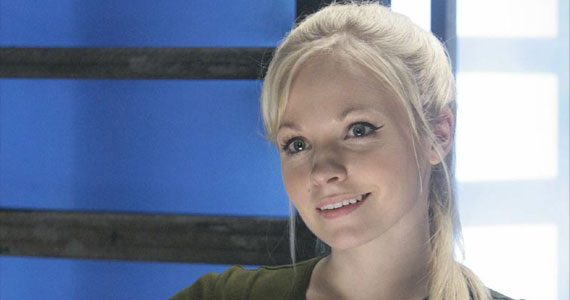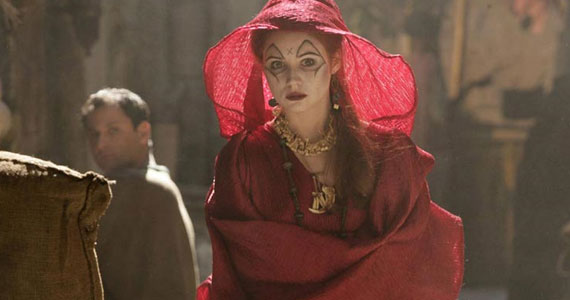The Writers of Yesterday (The RTD Era)
Guest contributor Patrick Kavanagh looks at the ones that got away.
Since the revival of Doctor Who in 2005, many writers have graced our screens. Some have written great episodes, others have written poorer ones. Russell T Davies in his era gave us some truly brilliant episodes. Throughout his rein though he had dozens of writers all collaborating into four whopping great series and numerous specials. I’ve chosen to look back at some of those writers. Particularly the ones who didn’t make the changeover into Steven Moffat’s generation. I also pose the question, would we want them back?
Robert Shearman

Shearman gave us the brilliant Dalek way back in 2005. It was an emotionally-powerful episode and allowed the audience to really feel the pain of the Dalek and just how lonely it was. The verdict on Robert Shearman would be a definite yes. If he wrote more episodes like Dalek and maybe reintroduced a classic era foe to Moffat’s new audience then that’d be a sure fire success.
Paul Cornell

Virgin New Adventures writer Paul Cornell gave us the very interesting Father’s Day. It introduced Rose’s father, Pete Tyler, with a great performance from Shaun Dingwall. The episode got a slightly mixed reception but I really enjoyed it. Cornell’s next outing was two series later with David Tennant and Freema Agyeman in Human Nature/The Family of Blood. I enjoyed it and found the cliffhanger one of the best of that series. It was received rather positively so if Cornell were to return, I’m sure he’d give us another unusual episode. My only problem is that he should maybe set an episode in the present day or the future; he’s already done three episodes set in the past.
Matt Jones

Unknown to him at the time, Matt Jones probably never expected the Ood would go on to be one of the most used monsters in the revived series. Appearing in five stories (more if you count mini-episodes) the Ood along with the Cybermen and Daleks are significant foes in the world of Doctor Who. Their debut in The Impossible Planet/The Satan Pit sees the creatures possessed by The Beast. As I was a fair bit younger when I saw the episode for the first time it terrified me. The scenes in the ventilation shafts scared the wits out of me. If Matt Jones were to produce another episode then I’d be getting ready to hide behind the sofa…again!
Helen Raynor

Producing four episodes, (essentially two stories), Helen Raynor has managed to give us one great story and another more ridiculous one. Her first two parter, Daleks In Manhattan/Evolution of The Daleks has been ridiculed by fans and scorned by critics. It wasn’t very enjoyable and the Human-Dalek idea sounds good on paper but the final outcome was goofy-looking while Eric Loren (Mr Diagoras) didn’t bring very much to the role except speaking very slowly. Admittedly it was watchable but uninteresting with a slow first half and a speedy finale. So far not so good, but in 2008 we got Helen Raynor’s next offering, The Sontaran Stratagem/The Poison Sky. A good fun story that reintroduced us to ‘military’ Martha and the Sontarans. Praised critically for being very like a Classic story (which Whovians want of course) this two-parter didn’t fail. For some reason, I don’t want Helen Raynor to return. Although she scored perfectly with the Sontaran story, her Daleks horror still remains prominent in my mind. So my final answer would have to be no.
Stephen Greenhorn

Stephen Greenhorn has had a very mixed CV in Doctor Who. His first episode, The Lazarus Experiment had a mostly positive reception from the fandom and critics. Greenhorn’s script was praised and the chemistry of Martha and The Doctor really blooms for me. After The Lazarus Experiment, one series later with Catherine Tate, Stephen Greenhorn returns, with The Doctor’s Daughter. I suppose in a way it’s like Neil Gaiman’s The Doctor’s Wife. Many predicted who The Doctor’s wife was and nobody was right. In The Doctor’s Daughter, people did the same and few guessed that his daughter would be created within the space of five minutes to a ridiculous idea. Whereas Gaiman’s reveal of the ‘wife’ takes up forty-five minutes and is so much more engaging. Another episode with mixed reviews, some loved it, some liked and some hated it. I enjoyed it but didn’t think it was great. I’d say yes to Greenhorn writing again, in some ways I’d like him to return and stun Moffat’s new viewers a bit like Tom MacRae’s amazing comeback in which he gave us the spectacular, The Girl Who Waited.
James Moran

The Fires of Pompeii was broadcast on our screens in 2008 to largely positive reviews. When I first saw it (remember I was young!) I hated it. I thought it was boring and didn’t have enough guns and lasers and general sci-fi tech. If your wondering how I got through Partners In Crime then it Catherine Tate’s great performance and the whole episode was pretty comical. I think the main reason I didn’t enjoy The Fires of Pompeii was due to the fact it was a very adult episode. The concept, ‘should The Doctor warn people of their death’ was a difficult one for a young child and if you ask a junior fan of the show what they like the most about it, the answer will probably be something to do with their love of the monsters, the TARDIS and The Doctor. As well as adding culture clash humour, the episode stays serious. Doctor Who in my opinion has gotten much more serious now it’s under Steven Moffat’s control. So, James Moran: a serious writer and a serious TV show, that’s a match made in heaven.
Keith Temple

I recently watched Keith Temple’s Planet of the Ood and found I found it much more pleasurable than my first viewing of it. In light of my previous paragraph about The Fires of Pompeii, I was very young when I watched this. Planet of the Ood had a strong moral theme about humanity and its nature. Slavery is explored more than any other episode and rather fearing the Ood like in Matt Jones’ The Impossible Planet/The Satan Pit, you find yourself pitying them and empathizing with them. Donna advances to become a more well-rounded companion and the script suits her perfectly. Her loud-mouth Londoner persona shines through at points (“Why do you say ‘Miss’? Do I look single?”) but she still humanises The Doctor once more. Keith Temple hasn’t expressed much interest at returning to ‘Who’ so I think maybe his episode is just a one off. I’d be pleased at him returning ,but not madly enthusiastic.
Phil Ford

Although he has written over ten episodes of ‘The Sarah Jane Adventures,’ Ford has co-written one episode of Doctor Who. He also wrote Dreamland a disappointing and stiff animation back in 2009. That was by himself so, if he was to come back and write another episode on his own then it isn’t looking good. But then…he did co-wrote one of the best Tenth Doctor stories, The Waters of Mars. It was an amazing story with a terrific and terrifying villain and a strong-minded and clever companion (although we do have a lot of them.) RTD wrote most of the episode though and Ford originally pitched a swords and sorcery tale. The brief synopsis available on ‘The Waters of Mars’ Wikipedia page sounds terrible so I’ll let you be the judge on that one. But my opinion would be for Phil Ford to stay put. He’s a bit like Russell T Davies, he (probably) won’t be coming back anytime soon.
Stephen Fry
I know, strictly speaking that Stephen Fry hasn’t actually written any episodes of Doctor Who, so I’ll try and keep this paragraph short. When Series 2 with David Tennant and Billie Piper was coming to a close, we got Fear Her, an appallingly bad episode made by Matthew Graham. Graham would later go on to write the slightly better two-part story The Rebel Flesh/The Almost People. Before Fear Her had even gone into production, Russell T Davies had talks with Fry and he had agreed to do an episode. Unfortunately as the script was too complex/expensive, Davies pushed it back to Series 3. Unfortunately, the story was never made as Fry couldn’t find the time to make the necessary changes to the script. At the time of writing, few details have been released about the episode. The reason, I’ve told you all this is because I’d love Stephen Fry to write an episode of Doctor Who. Wouldn’t you?
So there you have it, the nine writers whom I’d like or not to return. – each with their own pros and cons.
Now what’s your opinion, who would you like to write for the new series and who do you think should stay where they are?








